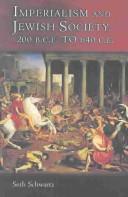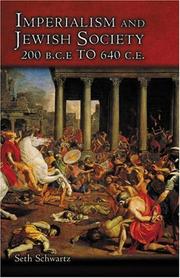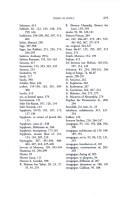| Listing 1 - 10 of 20 | << page >> |
Sort by
|
Book
ISBN: 9781107041271 9781107669291 9781139649476 1107669294 1107041279 1139649477 1139949381 1139950436 Year: 2014 Volume: *25 Publisher: Cambridge Cambridge University Press
Abstract | Keywords | Export | Availability | Bookmark
 Loading...
Loading...Choose an application
- Reference Manager
- EndNote
- RefWorks (Direct export to RefWorks)
This is an accessible and up-to-date account of the Jews during the millennium following Alexander the Great's conquest of the East. Unusually, it acknowledges the problems involved in constructing a narrative from fragmentary yet complex evidence and is, implicitly, an exploration of how this might be accomplished. Moreover, unlike most other introductions to the subject, it concentrates primarily on the people rather than issues of theology and adopts a resolutely unsentimental approach to the subject. Professor Schwartz particularly demonstrates the importance of studying Jewish history, texts and artefacts to the broader community of ancient historians because of what they can contribute to wider themes such as Roman imperialism. The book serves as an excellent introduction for students and scholars of Jewish history and of ancient history.
Jews --- Judaism --- Juifs --- Judaïsme --- History. --- Civilization. --- Histoire --- Civilisation --- Palestine --- Judaïsme --- History --- Civilization --- HISTORY --- Jews. --- Joden. --- Judaism. --- Juden. --- Ancient --- General. --- Civilisation. --- 586 B.C.-638 A.D. --- Israel --- Middle East --- Jews - History --- Judaism - History --- Jews - Civilization --- Palestine - History

ISBN: 128208710X 9786612087103 1400824850 9781400824854 0691117810 9780691117812 9780691088501 0691088500 9780691117812 0691088500 6612087102 Year: 2009 Publisher: Princeton, NJ
Abstract | Keywords | Export | Availability | Bookmark
 Loading...
Loading...Choose an application
- Reference Manager
- EndNote
- RefWorks (Direct export to RefWorks)
This provocative new history of Palestinian Jewish society in antiquity marks the first comprehensive effort to gauge the effects of imperial domination on this people. Probing more than eight centuries of Persian, Greek, and Roman rule, Seth Schwartz reaches some startling conclusions--foremost among them that the Christianization of the Roman Empire generated the most fundamental features of medieval and modern Jewish life. Schwartz begins by arguing that the distinctiveness of Judaism in the Persian, Hellenistic, and early Roman periods was the product of generally prevailing imperial tolerance. From around 70 C.E. to the mid-fourth century, with failed revolts and the alluring cultural norms of the High Roman Empire, Judaism all but disintegrated. However, late in the Roman Empire, the Christianized state played a decisive role in ''re-Judaizing'' the Jews. The state gradually excluded them from society while supporting their leaders and recognizing their local communities. It was thus in Late Antiquity that the synagogue-centered community became prevalent among the Jews, that there re-emerged a distinctively Jewish art and literature--laying the foundations for Judaism as we know it today. Through masterful scholarship set in rich detail, this book challenges traditional views rooted in romantic notions about Jewish fortitude. Integrating material relics and literature while setting the Jews in their eastern Mediterranean context, it addresses the complex and varied consequences of imperialism on this vast period of Jewish history more ambitiously than ever before. Imperialism in Jewish Society will be widely read and much debated.
Jews --- Judaism --- Hellenistic Judaism --- Judaism, Hellenistic --- Civilization --- Greek influences. --- History --- Palestine --- Aelia Capitolina. --- Ancient Judaism (book). --- Archaeology. --- Avodah Zarah. --- Bar Kokhba revolt. --- Beit She'an. --- Book of Deuteronomy. --- Cambridge University Press. --- Capernaum. --- Cathedra. --- Christian. --- Christianity. --- Christianization. --- Church Fathers. --- Early Period. --- Eastern Mediterranean. --- Edom. --- Egypt (Roman province). --- Epigraphy. --- Euergetism. --- Exegesis. --- First Jewish–Roman War. --- Galilean. --- Gentile. --- God. --- Grandee. --- Hebrew Bible. --- Hellenistic period. --- Hellenization. --- Herodian. --- Iconography. --- Ideology. --- Idolatry. --- Israel. --- Israelites. --- Jewish Christian. --- Jewish Palestinian Aramaic. --- Jewish culture. --- Jewish diaspora. --- Jewish history. --- Jewish identity. --- Jewish literature. --- Jewish prayer. --- Jewish religious movements. --- Jewish studies. --- Jews. --- Judaism. --- Judaization. --- Judea (Roman province). --- Kohen. --- Late Antiquity. --- Leiden. --- Levine. --- Libanius. --- Lifshitz. --- Literature. --- Maccabean Revolt. --- Menorah (Temple). --- Mishnah. --- Narrative. --- Near East. --- Paganism. --- Palestinian Jews. --- Persecution. --- Pharisees. --- Piyyut. --- Ptolemaic Kingdom. --- Rabbi. --- Rabbinic literature. --- Religion. --- Religiosity. --- Rhetoric. --- Rite. --- Roman Empire. --- Roman Government. --- Samaritans. --- Scythopolis (see). --- Second Temple period. --- Second Temple. --- Sect. --- Sefer (Hebrew). --- Seleucid Empire. --- Seminar. --- Sepphoris. --- Shabbat. --- Synagogue. --- Syria Palaestina. --- Tax. --- Temple in Jerusalem. --- Theology. --- Tiberias. --- Torah reading. --- Torah study. --- Torah. --- Tosefta. --- Tractate. --- Upper Galilee. --- Urban culture. --- Writing. --- Yohanan.
Book
ISBN: 9786612263736 1400830982 1282263730 9781400830985 9781282263734 9780691140544 0691140545 Year: 2009 Publisher: Princeton, NJ
Abstract | Keywords | Export | Availability | Bookmark
 Loading...
Loading...Choose an application
- Reference Manager
- EndNote
- RefWorks (Direct export to RefWorks)
How well integrated were Jews in the Mediterranean society controlled by ancient Rome? The Torah's laws seem to constitute a rejection of the reciprocity-based social dependency and emphasis on honor that were customary in the ancient Mediterranean world. But were Jews really a people apart, and outside of this broadly shared culture? Were the Jews a Mediterranean Society? argues that Jewish social relations in antiquity were animated by a core tension between biblical solidarity and exchange-based social values such as patronage, vassalage, formal friendship, and debt slavery. Seth Schwartz's examinations of the Wisdom of Ben Sira, the writings of Josephus, and the Palestinian Talmud reveal that Jews were more deeply implicated in Roman and Mediterranean bonds of reciprocity and honor than is commonly assumed. Schwartz demonstrates how Ben Sira juxtaposes exhortations to biblical piety with hard-headed and seemingly contradictory advice about coping with the dangers of social relations with non-Jews; how Josephus describes Jews as essentially countercultural; yet how the Talmudic rabbis assume Jews have completely internalized Roman norms at the same time as the rabbis seek to arouse resistance to those norms, even if it is only symbolic. Were the Jews a Mediterranean Society? is the first comprehensive exploration of Jewish social integration in the Roman world, one that poses challenging new questions about the very nature of Mediterranean culture.
Jews --- Social interaction --- Reciprocity (Psychology) --- Judaism --- Human interaction --- Interaction, Social --- Symbolic interaction --- Exchange theory (Sociology) --- Psychology --- Social psychology --- Hellenistic Judaism --- Judaism, Hellenistic --- Hebrews --- Israelites --- Jewish people --- Jewry --- Judaic people --- Judaists --- Ethnology --- Religious adherents --- Semites --- Politics and government. --- History --- Religious aspects --- Judaism. --- Identity --- Social life and customs --- Talmud Yerushalmi --- Bible. --- Jerusalem Talmud --- Palestinian Talmud --- Talmud, Jerusalem --- Talmud, Palestinian --- Jerusalemische Talmud --- Talmud de Jérusalem --- Yerushalmi (Talmud) --- Talmud ha-Maʻarav --- Ben Sira (Book of the Apocrypha) --- Book of Ben Sira (Book of the Apocrypha) --- Book of Sirach (Book of the Apocrypha) --- Ecclesiasticus (Book of the Apocrypha) --- Ḥokhmat Shimʻon ben Sira (Book of the Apocrypha) --- Ḥokhmat Yehoshuʻa ben Sira (Book of the Apocrypha) --- Jesus Sirach (Book of the Apocrypha) --- Sefer Ben Sira (Book of the Apocrypha) --- Sefer Ḥokhmat Yehoshuʻa ben Sira (Book of the Apocrypha) --- Sirach (Book of the Apocrypha) --- Sirachbuch (Book of the Apocrypha) --- Wisdom of Ben Sira (Book of the Apocrypha) --- Wisdom of Jesus the Son of Sirach (Book of the Apocrypha) --- Wisdom of Sirach (Book of the Apocrypha) --- Words of Simeon ben Jeshua (Book of the Apocrypha) --- Criticism, interpretation, etc. --- Mediterranean Region --- Circum-Mediterranean countries --- Mediterranean Area --- Mediterranean countries --- Mediterranean Sea Region --- Intellectual life.
Digital
ISBN: 9781139649476 Year: 2014 Publisher: Cambridge Cambridge University Press
Abstract | Keywords | Export | Availability | Bookmark
 Loading...
Loading...Choose an application
- Reference Manager
- EndNote
- RefWorks (Direct export to RefWorks)

ISBN: 9781400824854 9780691117812 Year: 2009 Publisher: Princeton, N.J. Princeton University Press
Abstract | Keywords | Export | Availability | Bookmark
 Loading...
Loading...Choose an application
- Reference Manager
- EndNote
- RefWorks (Direct export to RefWorks)
Digital
ISBN: 9781400830985 9780691155432 Year: 2009 Publisher: Princeton, N.J. Princeton University Press
Abstract | Keywords | Export | Availability | Bookmark
 Loading...
Loading...Choose an application
- Reference Manager
- EndNote
- RefWorks (Direct export to RefWorks)

ISBN: 9004092307 9789004092303 Year: 1990 Volume: 18 Publisher: Leiden Brill
Abstract | Keywords | Export | Availability | Bookmark
 Loading...
Loading...Choose an application
- Reference Manager
- EndNote
- RefWorks (Direct export to RefWorks)
Priesters [Joodse ] --- Priests [Jewish ] --- Prêtres juifs --- Jews --- Priests, Jewish. --- History --- Historiography. --- -Priests, Jewish --- Hebrews --- Israelites --- Jewish people --- Jewry --- Judaic people --- Judaists --- Ethnology --- Religious adherents --- Semites --- Judaism --- -Historiography --- Priests --- Josephus, Flavius --- Josephus Historicus --- Flavius Josephus --- Flavius Iosephus --- Iosephus, Flavius --- Iosephus Historicus --- Priests, Jewish --- History&delete& --- Historiography --- Josephus, Flavius. --- Josephus Flavius. --- 168 B.C.-135 A.D. --- Flavius, Josephus --- Josephus Flavius --- Flavius Josèphe --- Josèphe, Flavius --- Flawiusz Józef --- Józef, Flawiusz --- Iosif, Flaviĭ --- Flaviĭ Iosif --- Joseph ben Mattathias --- Giuseppe, Flavio --- Flavio Giuseppe --- Yosef ben Matityahu --- Matityahu, Yosef ben --- Mattathias, Joseph ben --- Yosefus Flavyus --- Flavyus, Yosefus --- Yosefus --- José, Flavio --- Flavio José --- Ioseb, Pʻlaviosi --- Pʻlaviosi, Ioseb --- Iosephus, --- Josephus, --- Yozifus Flaṿyus --- Flavios, Iōsēpos --- Īosef --- Josefo, Flavio --- Josefo, Tito Flavio --- יוזיפוס, פלאװיוס --- יוסיפוס, פלאביוס --- יוסיפוס, פלאוויוס --- יוסיפוס, פלאװיוס --- יוסיפוס, פלביוס --- יוסיפוס, פלויוס --- יוסף בן מתתיהו --- יוסף בן מתתיהו (פלויוס) --- יוסף בן מתתיהו, --- יוספוס פלויוס --- יוספוס, פלאביוס --- יוספוס, פלאוויוס --- יוספוס, פלביוס --- פלאוויוס, יוזיפוס --- פלאוויוס, יוסיפוס --- פלאוויוס, יוספוס --- פלביוס, יוסיפוס --- פלביוס, יוספוס --- פלויוס, יוסיפוס --- يوسيفوس اليهودي --- Ἰώσηπος, Φλ. --- Iōsēpos, Phl. --- Ἰώσηπος, Φλαύιος --- Iōsēpos, Phlauios --- Ἰώσηπος, Φλαούϊος --- Iōsēpos, Phlaouios --- Jews - History - 168 B.C.-135 A.D. - Historiography.

ISBN: 0691088500 9780691088501 Year: 2001 Publisher: Princeton (N.J.): Princeton university press
Abstract | Keywords | Export | Availability | Bookmark
 Loading...
Loading...Choose an application
- Reference Manager
- EndNote
- RefWorks (Direct export to RefWorks)
Jews --- Judaism --- History --- Civilization --- Greek influences. --- Palestine --- Hellenistic Judaism --- Judaism, Hellenistic --- Hebrews --- Israelites --- Jewish people --- Jewry --- Judaic people --- Judaists --- Ethnology --- Religious adherents --- Semites --- Civilization&delete& --- Greek influences --- Jews - History - 168 B.C.-135 A.D. --- Jews - History - 70-638. --- Judaism - History - Post-exilic period, 586 B.C.-210 A.D. --- Jews - Civilization - Greek influences. --- Palestine - History - To 70 A.D.

ISBN: 9042911816 9789042911819 Year: 2003 Volume: 3 Publisher: Leuven Peeters
Abstract | Keywords | Export | Availability | Bookmark
 Loading...
Loading...Choose an application
- Reference Manager
- EndNote
- RefWorks (Direct export to RefWorks)
#GOSA:II.P.Alg.M --- #GOSA:XV.Jod.M --- #GOSA:XI.Oud.M --- Jews --- Judaism --- Christianity and other religions --- Civilization --- History --- Relations --- Christianity --- Palestine --- Congresses --- Rome --- 70-638 --- Talmudic period, 10-425 --- Medieval and early modern period, 425-1789 --- Hebrews --- Israelites --- Jewish people --- Jewry --- Judaic people --- Judaists --- Religion --- Holy Land --- Ethnology --- Religious adherents --- Semites --- Religions --- Jews - Holy Roman Empire - Civilization - Congresses. --- Jews - History - 70-638 - Congresses. --- Judaism - Relations - Christianity - Congresses. --- Christianity and other religions - Judaism - Congresses --- Judaism - History - Talmudic period, 10-425 - Congresses. --- Judaism - History - Medieval and early modern period, 425-1789 - Congresses. --- Jews - History - 70-638 - Congresses --- Judaism - History - Talmudic period, 10-425 - Congresses --- Judaism - History - Medieval and early modern period, 425-1789 - Congresses --- Palestine - History - 70-638 - Congresses
Book
ISBN: 9780190215217 0190215216 9780190632496 0190215224 0190632496 Year: 2017 Publisher: New York, NY : Oxford University Press,
Abstract | Keywords | Export | Availability | Bookmark
 Loading...
Loading...Choose an application
- Reference Manager
- EndNote
- RefWorks (Direct export to RefWorks)
The Oxford Handbook of Acculturation and Health brings together three very different, but complementary, streams of work: theoretical and methodological “basic” work on acculturation, and applied work linking acculturation to various health outcomes among international migrants and their families, and interventions applying acculturation-related principles to prevent or treat health behaviors or problems. In this volume, the work of landmark acculturation theorists and methodologists appears in the same volume as applied epidemiologic and intervention work on acculturation and public health. This volume highlights theoretical, methodological, and applied research on the study of acculturation in an effort to connect fundamental principles of acculturation theories with research linking these theories to health outcomes. Although the majority of acculturation and health research has been conducted on the experiences of Hispanic immigrants in the United States, the principles featured in this volume are also intended to apply to other immigrant groups in the United States and elsewhere.
Acculturation --- Health Status --- Health Behavior. --- Emigrants and Immigrants --- Hispanic Americans --- Acculturation. --- Indicateurs de santé. --- Habitudes sanitaires. --- Immigrés. --- Américains d'origine latino-américaine. --- United States --- États-Unis. --- Public health --- Community health --- Health services --- Hygiene, Public --- Hygiene, Social --- Public health services --- Public hygiene --- Social hygiene --- Health --- Human services --- Biosecurity --- Health literacy --- Medicine, Preventive --- National health services --- Sanitation --- Culture contact (Acculturation) --- Development education --- Civilization --- Culture --- Ethnology --- Assimilation (Sociology) --- Cultural fusion --- Social aspects --- Health Status. --- Hispanic or Latino. --- Health Behavior --- Emigrants and Immigrants. --- United States.
| Listing 1 - 10 of 20 | << page >> |
Sort by
|

 Search
Search Feedback
Feedback About UniCat
About UniCat  Help
Help News
News